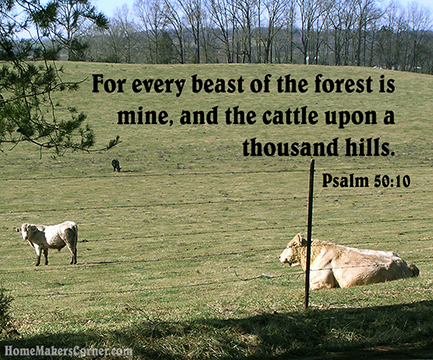Hard Questions -
Should We Be Self-Sufficient?
by Mary E. Stephens
July 2023
2 Corinthians 3:5 Not that we are sufficient of ourselves to think any thing as of ourselves; but our sufficiency is of God;
I was communicating with a friend once and we both used the term
“self-sufficient” in the course of our emails. Somehow it got me to
thinking.
We all know about the growing grassroots trend toward “self-sufficiency”
that some people think is so important. The idea is that we
should basically return to an agrarian society and all or mostly grow
and raise our own food. Much that is involved in this movement is, in
reality, based on worldly thinking. Because it seems reminiscent of the
way many Bible people lived and how scripture describes the coming
Kingdom when Jesus Christ reigns on this earth, there are quite a few Christians that have
bought into it.
One big concern is what will happen in the future. Many see evil and
hard times coming. They see too many totally dependent on the present
system of obtaining food and other necessities from Big Agra, as it
is called - the mega farms and food industry. They also see dependency upon
those that provide many other necessities of life.
Man is to earn his bread by the sweat of his brow, and Adam’s first job
was a gardener. Noah was also to eat the animals, so herders and farmers
can grow their own meat. King Uzziah loved husbandry (2 Chron. 26:10).
A wise king
will encourage farming as it is the food of the land. There are forms of
government that do encourage people to produce food for various reasons.
When people cannot eat of their own labor or sell it for gain, it
discourages people from producing.
These are all accepted and understood things. But, the fact of the
matter is that we are never told in the Bible that we are required to be
farmers or agrarian, let alone self-sufficient. Fishermen were not
self-sufficient. They would have needed to buy many products from other
for their basic needs. But, Jesus never rebuked His disciples for that
and, in fact, even helped with their livelihood on more than on
occasion. Jesus’ own trade, which he learned from Joseph, was carpentry,
not farming and being “self-sufficient.”
A better term than "self-sufficient" might be “prudent” since we are told in
Proverbs 22:3, A prudent man foreseeth the
evil, and hideth himself: but the simple pass on, and are punished.
Prudence also needs to have humility mixed with it. Sorry
to say, there is too often a good deal of pride and comparing among
themselves that goes into the self-sufficient movement.
Your see, one error that we can fall into is that of thinking we are wiser
or smarter than other Christians because we are “prepared” or
“self-sufficient” and they are not, forgetting that their sufficiency is
of God also. He can and will supply their needs even when they are not
what is defined as “ready” for troubled times. God actually does call some
of His children to live in cities and places where they can’t be
“self-sufficient” in the way some think necessary. In fact, I’d dare to
say that the majority of Christians live in such situations, and many of
them are in the will of God. It is wrong, then, for other Christians to
despise their brethren because they are not “working as hard as we do”
at being “self-sufficient.”
My dad was a pastor of small churches, and during the late 1970s and
1980s our income was so low we probably would have been considered to be
at poverty level at times. Yet the Lord made sure we did survive. It
required hard work - gardening, “tent mending” jobs for my dad, canning
and freezing our own and locally self-picked produce, “scrounging,” shopping
for bargains, wearing hand-me-downs and second hand clothes,
being conservative in use of things, and making our own homemade things
in various ways. We weren’t “self-sufficient” by a long shot, and we
didn’t have a lot of money, but God more than took care of our needs. We
even had enough to give away and pass on at various times and seasons.
In
Proverbs 6:6-8 we read,
Go to the ant, thou sluggard; consider her
ways, and be wise: Which having no guide, overseer, or ruler, Provideth
her meat in the summer, and gathereth her food in the harvest. So, the
idea is to prepare your food in summer. This is obvious to anyone who
ever put up food for winter use. It is a normal part of the cycle of
life in more agrarian areas. And, it certainly pays off for those who
can do it. But, we are not
told to be “self-sufficient.” The ants still get the food from God, as
other animals do.
Being God-sufficient and wisely using what we can is prudent. We are to use this world, but not abuse it Paul admonishes. 1 Corinthians 7:29-31 But this I say, brethren, the time is short: it remaineth, that both they that have wives be as though they had none; And they that weep, as though they wept not; and they that rejoice, as though they rejoiced not; and they that buy, as though they possessed not; And they that use this world, as not abusing it: for the fashion of this world passeth away.
Jesus also told us not to take thought for the morrow. Matthew 6:34 Take therefore no thought for the morrow: for the morrow shall take thought for the things of itself. Sufficient unto the day is the evil thereof.
Preparing the summer food for winter use is a good idea, but worrying about what we’ll have tomorrow is not. Taking thought for the morrow also is very applicable for those many who have lived in difficult places and literally had to trust God for their daily bread in ways many of us don’t. I think, though, of those who stockpile food and use up much time and effort to be “self-sufficient” when they could be spending the money and time on things with more eternal value. Putting food by (the ants) and farming and husbandry (gardening, chickens, animals) is commendable if it is possible, but the goal should be to supply our daily needs - to feed our families with some extra to share.
Let us be in the world but not of it (John
17:16-18). The world needs to be
self-sufficient because they are not sheep of the Good Shepherd. They
need to feel in control and able to rely on themselves because they don’t rely on God. And truly, they are not His children.
We should not be thinking and talking like the world in this manner. First, it kind of seems like an insult to God. Second, it takes our focus off of the Lord and His personal and detailed care for us. Third, it is a bad testimony to the unsaved when they hear us declare “we trust in God” and then hear us talking of being self-sufficient, and see us frantically preparing for possible disaster as if it were our sole responsibility to care for ourselves. Fourth, it can distract us from spiritual matters - edifying and encouraging the saints, our personal walk with God, and preaching the gospel. Some of us lack the physical ability to do much in the first place, and if we spend what strength we have on being "self-sufficient" we truly may have nothing left to serve the Lord. In fact, the church is supposed to care for the needs of the widows (1 Tim. 5:3-5, Acts 6). The church is to supply the food of those that ministered to them (1 Cor. 9:3-14).
Self-sufficiency is also a fragile thing. We know that riches can disappear quickly, and food and other survival "necessities" can be ruined by water or mold, or they can simply go bad.
Proverbs 23:5 Wilt thou set thine eyes upon that which is not? for riches certainly make themselves wings; they fly away as an eagle toward heaven.
Matthew 6:19-21 Lay not up for yourselves treasures upon earth, where moth and rust doth corrupt, and where thieves break through and steal: But lay up for yourselves treasures in heaven, where neither moth nor rust doth corrupt, and where thieves do not break through nor steal: For where your treasure is, there will your heart be also.
In a way, I’d rather be
spiritually prepared for hard times, crisis, or political and economic
turmoil than to be self-sufficient, financially “safe,” etc. Not because
I’m a better or more spiritual person than others, but because I have
known a few people who really walked with God and relied on Him - were
truly God-sufficient - and though they were weak they were strong. They
lived with great peace.
Hebrews 13:20-21 Now the God of peace, that brought again from the dead our Lord Jesus, that great shepherd of the sheep, through the blood of the everlasting covenant, Make you perfect in every good work to do his will, working in you that which is wellpleasing in his sight, through Jesus Christ; to whom be glory for ever and ever. Amen.

